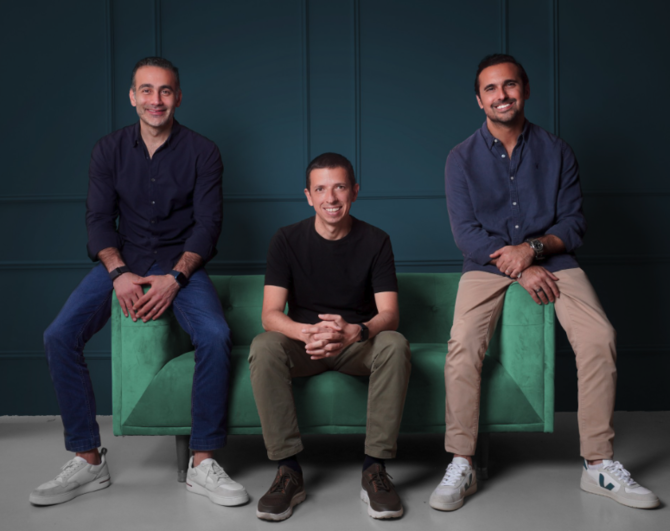CAIRO: The Middle East region has been witnessing a significant boost in startup activity, with numerous entrepreneurs securing funding across key sectors.
Additionally, multiple investment pools were established, with Qatari and Emirati venture capitals aiming to further amplify the ecosystem.
Regional startups are particularly eyeing the burgeoning Saudi market, with UAE-based proptech firm Stake raising $14 million in a series A funding round to enter the Kingdom.
The round was led by Middle East Venture Partners, with participation from Aramco’s Wa’ed Ventures, Mubadala, and Republic.
Founded in 2021 by Rami Tabbara, Manar Mahmassani, and Ricardo Brizido, Stake is a digital real estate investment platform that offers options for income-generating properties in Dubai.
The newly raised funds will be used to expand Stake’s services into Saudi Arabia this year.
In 2022, Stake closed its pre-series A round at $8 million, backed by MEVP and BY Ventures, with participation from returning investors Vivium Holding and Combined Growth Real Estate.
Saudi edtech Tahdir raises $270k in pre-seed round
Saudi-based edtech Tahdir has closed a pre-seed funding round of $270,000 from a group of angel investors.
Founded by Mohammed Al-Doukhi and Khalil Al-Haid, Tahdir’s platform automates daily school and educational management processes, and the company claims to be serving 92 schools with over 30,000 users.
The investment will help the company enhance its capabilities and expand its operations within the Kingdom.
Egypt-based medtech i‘SUPPLY secures pre-series A round

i‘SUPPLY was founded in 2022 by Ibrahim Emam, Malek Sultan and Moustafa Zaki. Supplied
Egypt-based medical tech startup i‘SUPPLY has secured a pre-series A round, bringing its total funding to $2.5 million since its inception in 2022.
This round saw participation from several investment funds, including Disruptech Ventures, OneStop Capital, Axian Investment CVC, and Egypt Ventures.
Founded by Ibrahim Emam, Malek Sultan, and Moustafa Zaki, i‘SUPPLY aims to digitize the pharmaceutical business by offering a one-stop-shop solution to quickly predict and overcome supply chain disruptions.
The new funding will bolster i’SUPPLY’s expansion plans, enhance its capabilities in financing small and medium-sized pharmacies, and further develop its fintech offerings and technological services.
Egyptian fintech Sahl raises $6m in series A round
Cairo-based fintech Sahl has raised $6 million in an investment that acts as a series A and seed funding round led by Ayady for Investment and Development. Existing investors Egypt Pay, Delta Electronic Systems, and E-Finance also participated in the round.
Founded in 2020 by Ahmed Othman, Ibrahim Assal, and Abullah Assal, Sahl is a bill payment platform that allows users to recharge prepaid cards.
The company is one of the few Egyptian firms integrating directly with several government entities.
The new funds will help refine and develop Sahl’s offerings and extend its services to Saudi Arabia after its regional launch in the UAE.
UAE’s Qstay raises $4.6m in pre-series A round

Jumeirah beach residence. Supplied.
UAE-based hospitality platform Qstay has raised $4.6 million in a pre-series A funding round through a combination of conventional and convertible debt.
Founded in 2020 by Artur Khayrullin, Ekaterina Rogozhina, Alec Fesenko, and Natalya Fesenko, Qstay operates as a virtual hotel brand with 200 units.
Qstay provides digital app-based access to nearby pools, beaches, gyms, and spas for guests staying in beachfront properties.
To date, the company has raised $11.1 million. In July 2022, Qstay closed a debt and equity Seed round of $6.5 million.
UAE-based Polynome Group announces $100m fund for AI startups
UAE-based event management company Polynome Group has announced a $100 million fund to invest in artificial intelligence startups.
The fund will target startups in technology, AI software applications, and robotics, aligning with goals to expand the adoption of digital technologies beginning in the first quarter of 2025.
The fund will adopt the “founders for founders” concept, investing in seed, series A, and growth stage startups with initial investments ranging from $500,000 to $5 million per company.
UAE-based contech Tenderd secures $30m in series A funding
Construction technology firm Tenderd has closed a $30 million series A funding round, led by A.P. Moller Holding, with new investors Quadri Ventures and Saurya Prakash joining existing investors Wa’ed Ventures, Nakhla Ventures, SOMA Capital, and Liquid 2 Ventures.
Founded in 2018 by Arjun Mohan, Tenderd provides customers with AI-generated insights to increase asset utilization and reduce emissions, focusing on heavy industries such as construction and logistics.
The capital will fuel technological innovations and support the UAE-based firm’s global expansion efforts.
Qatar-based Rasmal Ventures launches first home-grown fund
Qatar-based VC firm Rasmal Ventures LLC has launched its first home-grown fund, aiming to drive innovation and investment in Qatar and the Middle East and North Africa region.
The Rasmal Innovation Fund I LLC targets high-performance startups in climate tech, fintech, business to business Software-as-a-Service, and AI sectors.
For the initial closing, the fund has raised $30 million from institutional investors and family offices, with the goal of reaching $100 million in investment commitments.
Kuwait-based travel tech Waves secures investment round
Kuwait-based travel tech startup Waves has closed an investment round for an undisclosed amount, co-led by BNK Capital and Aujan Enterprises.
Founded in 2021 by Abdulrahman Al-Sadoun and Sulaiman Al-Tunaib, Waves is an online marketplace for booking sea trips, marine activities, and chalets with operations in Kuwait, Saudi Arabia, Qatar, and the UAE.
The investment will be used to enhance Waves’ services in Saudi Arabia.
E-commerce platform Orisdi raises six-figure bridge round
Iraq-based e-commerce platform Orisdi has raised a six-figure bridge round of investment, backed by existing investors including Al Sharqiya TV Group, Iraq Venture Partners, and various angel investors.
Founded in 2019 by Ahmed Al-Kiremli and Hala Usama, Orisdi offers a range of products across verticals such as perfumes, cosmetics, appliances, stationery, and electronics.
This funding round, which closed in April 2024, will support Orisdi’s business development efforts and highlight the potential of the e-commerce sector in Iraq.





















